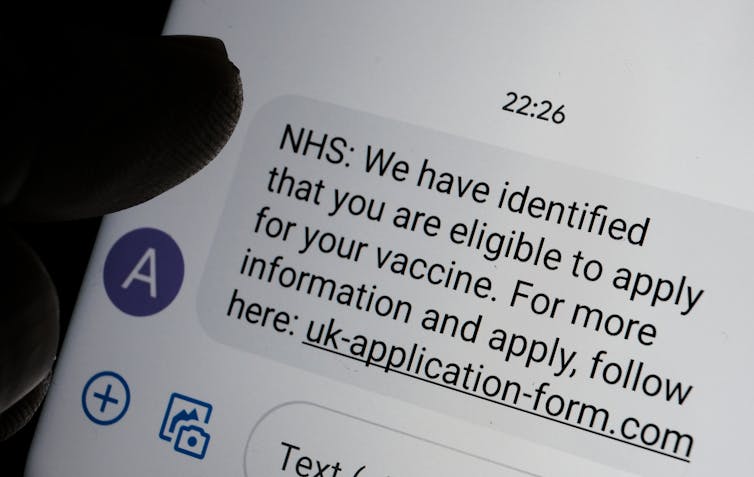Coronavirus vaccine scams – fraud experts give their top tips to help you stay safe

The NHS will never ask you to pay to receive your COVID-19 vaccination. My Agency/Shutterstock
24 February 2021
Writing in The Conversation Dr Gareth Norris and Alexandra Brookes from the Department of Psychology discuss the COVID-19 scams that have emerged while people wait for their vaccine and ways to help you stay safe.
Across the world, many of us are patiently waiting to be called for the COVID-19 vaccine. And where there is anticipation and hope, fraudsters are also finding ways to exploit people’s vulnerabilities.
Many COVID-19 vaccine scams have emerged, ranging from requests for people to pay for jabs, provide bank and card details to reserve their place with the NHS, along with the offer of “spare” vaccines on the black market. There was even one case where a fraudster, claiming to work for the NHS, injected a 92-year-old woman with a fake COVID-19 vaccine in her house – and charged her £160 for the privilege.
Many of these scams will not necessarily be targeted at specific people. Rather scammers will randomly target phone numbers or email addresses – often these contact details have been stolen and are available to buy on the dark web. Scammers will disguise the number or email they use to mimic the real sender – such as the NHS – and will send thousands of messages in the hope of one or two responses.
Given the number of similar scams out there, it’s important to be able to tell which messages are real and which are fake. But this can prove difficult, as although most of us generally know what to look out for, our emotions can override these sensibilities and lead us to make quick decisions without stopping to consider any “red flags”.
What to look out for
To explain how we make decisions, psychologist, Daniel Kahneman, describes two modes of thinking: “system one” and “system two”. System one is described as “the brain’s fast, automatic, intuitive approach”, while system two is “the mind’s slower, analytical mode, where reason dominates”. Kahneman suggests that while system two thinking is more helpful for difficult decision-making, it also takes more time and cognitive effort and so system one is more influential in guiding our choices in everyday situations.
But herein lies the problem, because we often make decision “short cuts” based on how we feel. And so our emotions can compromise our thinking which can lead us to become victims of fraudulent activity.

Knowing this, fraudsters use a range of techniques to exploit our emotions – most commonly using what’s known as “the scarcity principle”. This can include having only a few products left at a “special price”, or “time-limited offers” – both of which tend to override our system two analytical thinking. This is because scarcity and time pressure exert significant pressure on our rational decision-making. And this can encourage us to make quick yet problematic decisions.
The targets
Anyone can be a victim of fraud and there’s little evidence that age, gender or personality make you more susceptible. People often assume that older people are more likely to be victims, but age can be a protective factor in some situations. Older people are less likely to rely on technology, while many young people conduct a large part of their lives online. But of course, the flip side to this is that when older people do use technology they can be more at risk.
Research also suggests that the fact that mobile phones are almost always on – and constantly updating us with new bits of information – can further compromise our ability to detect phishing and fraud attempts. This is because we don’t always stop to think before clicking on a link or replying to a message.
Scammers also understand how to time their campaigns and know that people are primed to expect certain messages at certain times of the year. For example, around April and May is when tax refunds are issued and fraudsters target people en masse – even researching the average tax refund amount – as they know people are expecting or even desperate for their money. The wait to be called for your COVID-19 vaccination is similar. Everyone is waiting for their turn and this emotion can override our rational decision-making if a text or email arrives.
Do your research
Receiving notification of your vaccine appointment is likely to create feelings of excitement and relief or even trepidation. And so it’s an emotional issue that could potentially be exploited. To avoid falling victim to vaccine scams, make sure you take time to look at the content of any messages or emails, along with where they have come from. Email addresses and language errors can be useful in helping to spot fraudulent communications.
Our research examines the way people use visual cues in phishing emails and looks at how reliable these are in terms of discerning the authenticity of the source. And we’ve found that even for relative experts, such as ourselves, this is no easy task.
The bottom line: never respond immediately to a text or email and avoid clicking any direct links. Always go to the official website if you can. It’s also worth researching the process of receiving your vaccine, including how the NHS will contact you. This will make sure you know what to expect and will enable you to better lookout for any messages that don’t seem right.![]()
This article is republished from The Conversation under a Creative Commons license. Read the original article.



